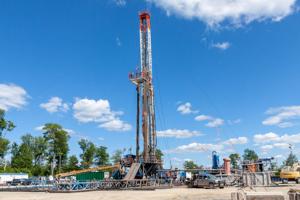U.N. climate report: Cut methane now to buy more time for decarbonization

(The Center Square) – Countries must eliminate carbon emissions over the next 30 years and other harmful air pollutants, like methane, to stave off a catastrophic rise in global temperatures, the latest United Nations climate report finds.
Scientists on the U.N. Intergovernmental Panel on Climate Change published an updated assessment Monday that reiterated the Earth could warm by more than 2 degrees Celsius before the century’s end if greenhouse gas emissions remain unchanged.
At that rate – far beyond the 1.5 degrees Celsius goal set by 2015 Paris Agreement – rising sea levels will swallow parts of coastal cities and extreme weather, from triple-digit heat waves to wildfires, will become commonplace and “intolerable.”
“This report is a reality check,” said IPCC Working Group I Co-Chair Valérie Masson-Delmotte. “We now have a much clearer picture of the past, present and future climate, which is essential for understanding where we are headed, what can be done, and how we can prepare.”
And although the report notes that achieving net zero carbon emissions by 2050 will keep temperature increases in line with the Paris goal, scientists for the first time said reducing “short lived climate forcers,” methane chief among them, goes hand-in-hand with staving off the worst impacts of climate change.
“If there’s one simple takeaway, it’s urgency,” said Dr. Ilissa Ocko, senior climate scientist with the Environmental Defense Fund, during a new briefing with reporters on Monday. “Humans are driving changes at every level of our climate system … So this profound influence on the climate system also means that we have the power to change this trajectory, to plot a safer course for ourselves and for generations to come.”
Methane emissions account for 20% of the current warming recorded on Earth, second only to carbon at 45%, Ocko said. But unlike the latter, methane only remains in the atmosphere for about a decade – meaning reducing it now will slow the planet’s trajectory toward irreversible climate change.
“Reducing methane will not solve the climate crisis alone, but it is an unparalleled opportunity to shave off critically important fractions of a degree of warming, and fast,” Ocko said.
Carbon, however, builds up in the atmosphere over time, making its elimination critical for stabilizing the climate long-term. Addressing both pollutants will realize health and environmental benefits to improve lives now while preparing for the future, the report concludes.
“The bad news is, dangerous climate change has arrived,” climate scientist Michael Mann of Penn State University told ABC News. “The good news is, we can prevent it from getting worse. The latest science tells us that if we bring our carbon emissions down to zero, the planet stops warming up.”
Methane’s role in climate change went unacknowledged for years, Ocko said, because scientists focused on long-term solutions to rising temperatures. But that doesn’t mean policymakers weren’t beginning to consider ways to reduce its prevalence, either.
In 2016, the Environmental Protection Agency began regulating methane emissions from the oil and gas industry – one of the largest sources of the pollutant on the planet. Companies invested in leak detection technologies that, applied on a widespread scale, Ocko said, could reduce methane output by 75%.
Former President Donald Trump suspended the regulation before leaving office last year, though Congress recently voted to reinstate it.
Oil and gas companies – including Shell, BP, Exxon and the Pittsburgh-based EQT – agree that containing methane leaks is both financially prudent and environmentally important if natural gas will serve as the bridge fuel in the national and worldwide renewable energy transition.
Now, President Joe Biden’s administration is currently contemplating a new methane rule that would crack down on leaks from older oil and gas wells, though the expansiveness of such a regulation – and whether it would capture low-producing sites – is still unknown.
It’s of particular interest in Pennsylvania, where Gov. Tom Wolf adopted a plan to reduce the state’s methane emissions in step with his overall climate goal to reduce carbon emissions 26% over the next five years. Under his direction, the Department of Environmental Protection began regulating methane from new sources as of 2018.
A similar rule that targets wells built before 2013 is under consideration and environmental groups, EDF among them, hope it will be expansive enough to include the state’s 70,000 low-producing conventional wells.
The current draft language exempts any source that produces less than the equivalent of 15 barrels of oil per day – or about 99% of the state’s conventional wells that existed before 2013.
These wells, according to Earthworks, an environmental advocacy group, account for half of the oil and gas industry’s methane emissions in Pennsylvania.
The DEP estimates it would cost about $7,000 to bring each well into compliance. It’s an expense that some owners of these sites argue is onerous and unnecessary.
Jamar Thrasher, a department spokesperson, told The Center Square last month that the DEP initially included the exemption based on analysis from the federal EPA that likewise determined controlling leaks of volatile organic compound emissions from low producing wells was not a cost effective solution.
“As a result of information and data received during the public comment period following the proposed rule, we are performing further analysis to reevaluate the VOC emissions from these wells to ensure the appropriate requirements which will be included in our final regulations,” he said.
The agency, in documents, estimates that its pending rule will reduce methane emissions by more than 75,000 tons per year. The finalized regulation is expected later this year.
Ocko said Monday, however, that other sources of methane emissions may be harder to address. About 30% of global methane emissions from the agricultural industry, EDF estimates.
“Oil and gas is definitely our lowest hanging fruit, but we will need action in other sectors as well, particularly landfills and livestock,” she said.
Disclaimer: This content is distributed by The Center Square
